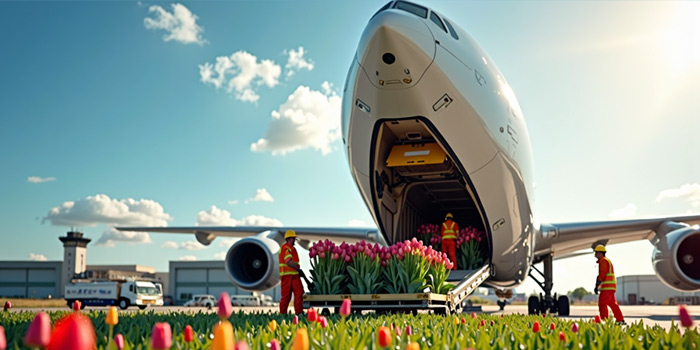The Blossoming Business of Airborne Flowers: How Air Transport Fuels the Global Floral Trade
08 May 2025
Highlights:
The global floral industry has flourished over the past two decades, largely due to the efficiency and reliability of air cargo. With the market value of flowers transported by air surging from USD 852 million in 2003 to USD 3.7 billion in 2024—a nearly fourfold increase according to the International Air Transport Association—air transport has cemented itself as the backbone of international floral trade. The ability to move delicate, perishable blooms across continents within hours has transformed the industry, ensuring year-round access to fresh flowers for consumers worldwide.

Shifts in Import Markets
In the early 2000s, the United States, United Kingdom, and Germany were the dominant importers of air-transported flowers, accounting for 66.3%, 12.1%, and 4.4% of global imports, respectively. However, by 2024, market dynamics had shifted significantly. The U.S. continues to lead with 53.6% of imports, but the Netherlands has emerged as a powerful logistics hub, now handling 31.2% of floral imports. The UK's share, on the other hand, has declined to 5.5% according to IATA. The rise of the Netherlands as a key re-export center underscores the increasing role of efficient supply chain management and strategic trade positioning in the industry.
Evolution of Exporting Countries
The landscape of flower-producing nations has also evolved. In 2003, Colombia dominated exports with a 50.2% market share, followed by Ecuador at 16.2% and the Netherlands at 8.9%. But according to data from IATA, over the past two decades, Colombia's dominance has gradually decreased to 42.3%, making room for emerging players such as Kenya and Ethiopia. The growth of these African nations in the flower trade is a testament to their investment in greenhouse infrastructure, favorable trade agreements, and enhanced air freight capabilities, positioning them as formidable competitors in the global floral market.
Key Drivers of Market Dynamics
Many factors have been instrumental in reshaping the airborne flower trade, including Trade Agreements, Market Expansion, and Advancements in Air Cargo Technology.Bilateral and multilateral trade agreements have significantly influenced the global flower trade by reducing tariffs and improving market access. Countries such as Kenya and Ethiopia have leveraged these agreements to penetrate new markets, diversifying their export destinations beyond traditional European buyers and into the U.S. and Asia.
The efficiency of the floral trade hinges on innovations in air cargo, particularly in refrigeration and logistics. State-of-the-art cold chain solutions ensure that flowers remain at optimal temperatures throughout their journey, preserving freshness and extending shelf life. Additionally, advancements in aircraft fuel efficiency and cargo capacity have allowed for the cost-effective transport of large floral volumes, further driving market growth.
A Blooming Future for Air Cargo
The global flower trade exemplifies the indispensable role of air transportation in facilitating the movement of high-value, perishable goods. With continuous improvements in logistics, supply chain efficiency, and trade policies, air cargo will remain a fundamental pillar of the floral industry. As sustainability concerns and consumer demand for fresh flowers continue to shape the future of the market, innovation in air freight will be crucial in ensuring flowers arrive in pristine condition, no matter their destination.
At AviaPro Consulting, we specialize in tailored air cargo solutions that optimize operations for airlines and logistics providers. From cold chain management and fleet optimization to regulatory compliance and sustainable air freight strategies, our expertise ensures that delicate cargo—like flowers—arrives with the utmost precision and care. As the floral trade continues to expand, AviaPro remains committed to helping businesses navigate the complexities of air cargo, keeping the world’s flowers fresh and flourishing.
AviaPro Newsroom
+1 416-544-9969
info@aviaproconsulting.com

Editorial Contacts